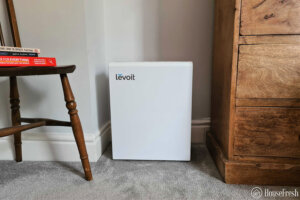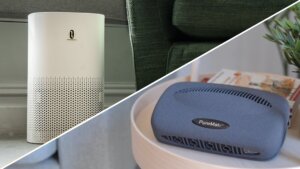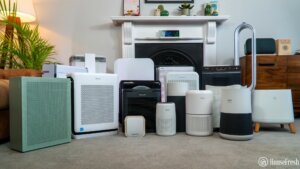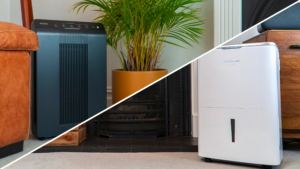An air purifier is a great way to keep your home clean and healthy. But can they also make you sick or cause any dangerous or unpleasant side effects?
In this article, we’ll discuss 3 possible reasons why your air purifier could be making you feel sick.
Firstly, what is an air purifier?

An air purifier is basically a fan combined with a filter of some kind that will remove dust, pollen, pet hair, VOC’s and any other smaller particles and pollutants that might be impacting the air quality in your room such as PM2.5 and PM10 which, whilst small, can cause havoc on your health.
As Americans spend an average of 90% of their time indoors, it’s important to have clean air where concentrations of these pollutants can be 2 to 5 times higher than in outdoor settings.
You can actually create your own DIY air purifier with a boxed fan and a $25 HEPA filter which are great for short-term use but we would always recommend investing in a gadget designed specifically for the task.
When an air purifier works it should be able to remove the following from the air:
- Microorganisms such as bacteria and viruses
- Mold spores
- Allergens like pet dander, dust, and pollen
- Harmful toxins like volatile organic compounds (VOCs)
- Smoke and odors
- PM2.5 and PM10 known as particulate matter – these are tiny particles that can easily penetrate the lungs as they can not be blocked by the bodies natural defenses

Can air purifiers make you sick?
In theory, an air purifier should alleviate health issues but some people find that their problems increase and they actually end up felling more sick.
There are three major reasons why this might happen:
1. Is the filter inside a plastic bag?

Yes, this happens more than you think but luckily is very simple to fix.
Many air purifiers now come packaged with the filter part inside a plastic wrapping. If you don’t remove this plastic then the air purifier will not be able to use the filter so it will act like a fan pushing pollutant air around the room and will make any respiratory problems worse.
So be sure to check this in your unit before you give up on air purifier technology!
2. Filter type
There are a number of different filters that an air purifier can use to filter the air, with the main one we recommend here at housefresh.com being HEPA.
HEPA was first invented during World War 2 as part of research into soldiers’ gas mask technology.

It’s not a new technology and there are thousands of peer-reviewed studies supporting its use for cleaning the air.
It works by using interwoven fibers that pick up particles as they are blown through the material.
It doesn’t create any secondary chemicals as it’s purely mechanical in nature.
So for anyone with any health issues, we always recommend looking at a system that primarily uses HEPA – the science is super clear and when it works properly it will help to reduce pollutants in the air.
The problem with HEPA filters is that they don’t come cheap.
HEPA filters over time become full of pollutants and need replacing before they stop working entirely. Filters can be upwards of $100 for larger units and will need changing as often as every 6 months so they can be a hard cost for the average consumer to swallow.

This is where air ionizer technology comes in with its promise to clean the air without costly filter replacements. They work by using high voltage to electrically charge particles that then become heavier and fall to the floor and can be removed.
The problem is that many of these units also create a small amount of ozone that can have health problems for those who are sensitive to it. If your air purifier uses Ionizer or Ionic technology and causes you health issues, then we would recommend replacing it with a HEPA-based unit as these clean the air and have zero emissions of ozone.
One of the big names in Ionizer technology was Sharper Image and after trying to sue Consumerreports they ended up giving $19 to every owner of the ionic breeze as part of a settlement and then declared bankruptcy back in 2008.
3. Using the wrong size air purifier for your space

If you buy a tiny air purifier hoping to clean your entire home you will be disappointed.
If the unit doesn’t have the power to clean enough air – then pollutants will linger in the air you breathe and in cases of bad outside pollution then dirty air will build up faster than you can clean it.
You then end up wasting electricity on cleaning a portion of the air but are unable to guarantee the air you breathe is not contaminated and so you might still feel sick.
Bottom line
An air purifier, when working correctly, can be a great tool in keeping your home air free of pollutants but some filter technologies may mean your air purifiers make you sick due to the ionizer side effects.
Ionizers and UV-C are less effective at cleaning and have been shown to cause more problems than they alleviate.
At HouseFresh we would recommend that you avoid air purifiers that use ionizer or UV-C technology as they have been shown to generate ozone and the evidence of their effectiveness at keeping air clean is debatable.
Sticking to HEPA technology is especially important for those with underlying respiratory illnesses and you also need to make sure you get the right-sized unit for your space.







